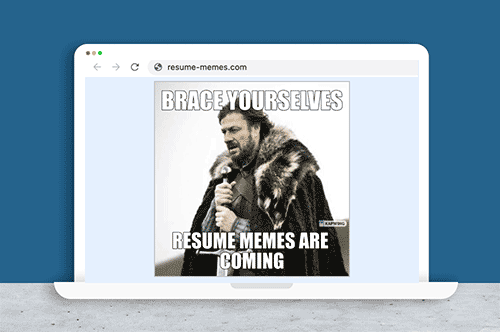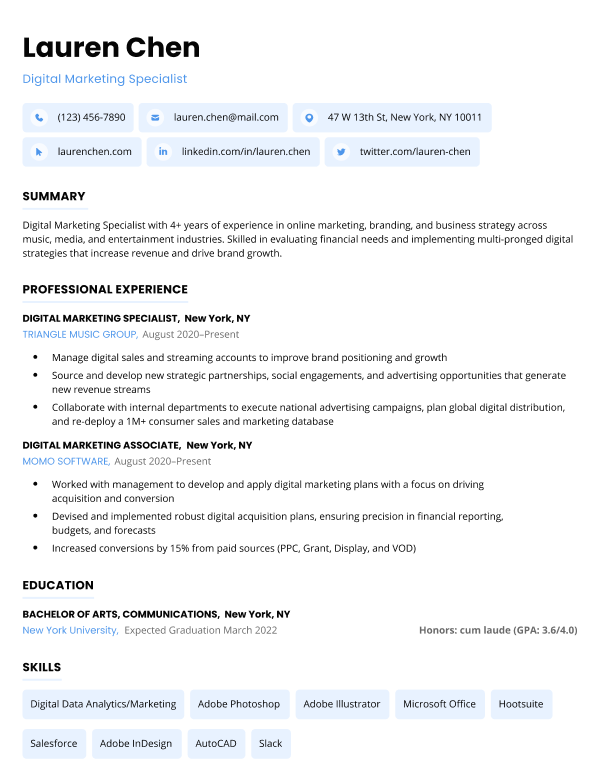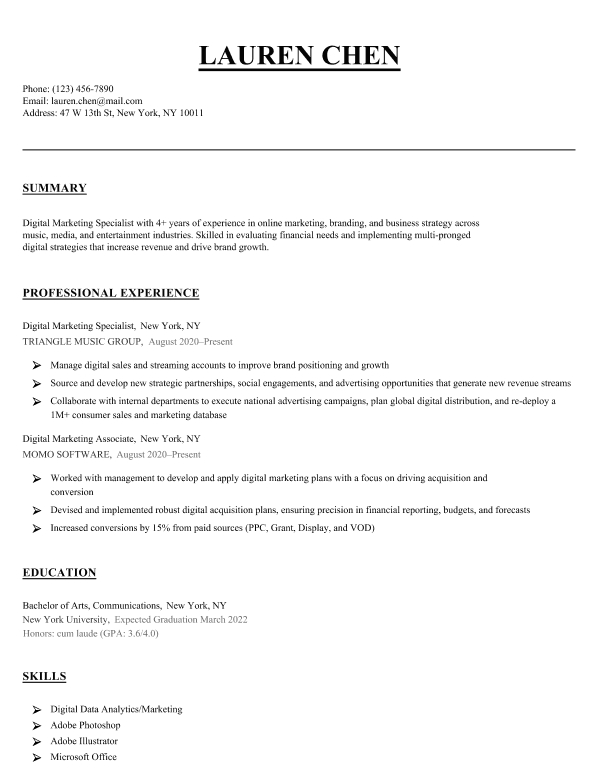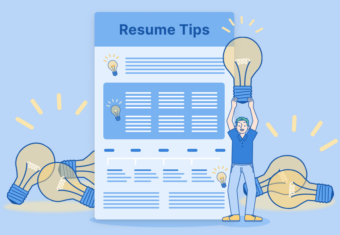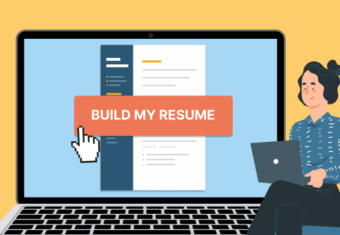Looking for a job isn’t easy. Whether you’re newly graduated, switching careers, or applying for high-competition positions, putting together a resume and sending out job applications is overwhelming. It’s no wonder many of us get sidetracked or start procrastinating.
If this is your first, third, or twentieth time updating your resume, you’re not alone. We’ve all had to do it at one point or another. That’s why there are so many great resume memes!
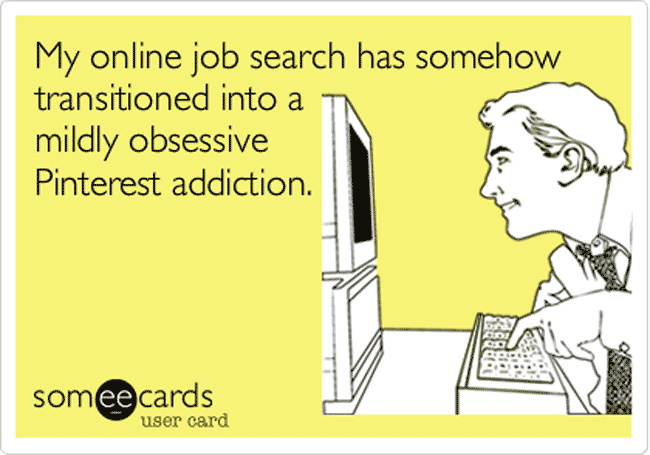
Here are some of our favorite resume memes of 2024, with some advice on how to stay sane and do your best throughout the job application process!
1. Remember you’re not alone
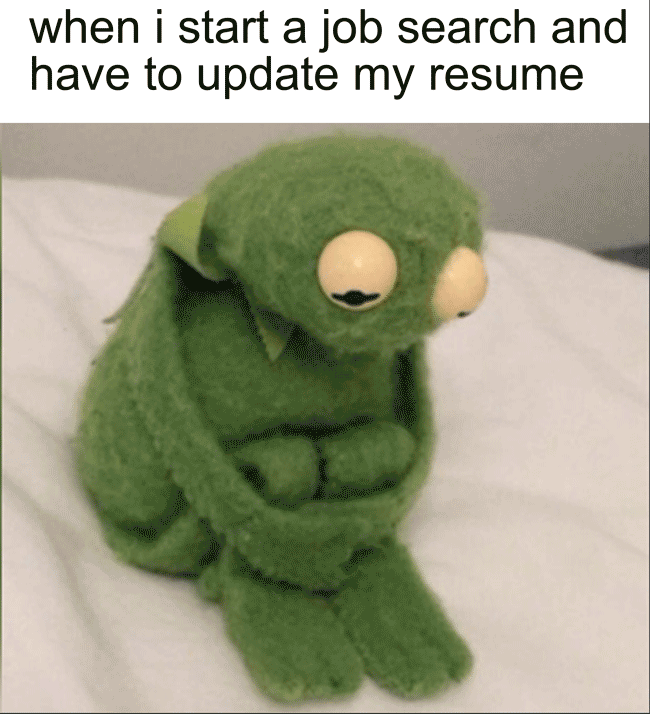
We’ve all been there. It’s time for a new job and that resume isn’t going to write itself. A great way to get motivated is to reference resume examples online for inspiration.
While resume writing isn’t a task that many people enjoy, try to reframe it as a challenge that will open the door to your next great opportunity.
After all, this could be the resume that lands you your dream job, or at least gets you one step closer.
2. We all have to start somewhere
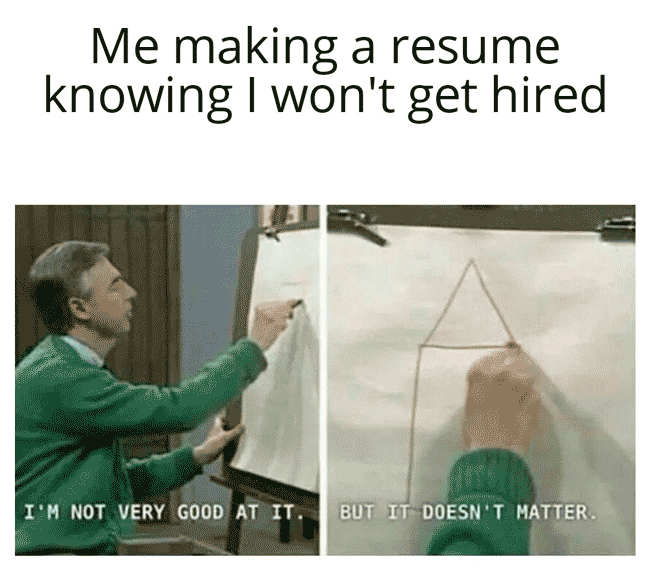
You definitely shouldn’t approach writing your resume with a defeatist attitude, but it’s not a bad idea to take a page out of Mr. Roger’s book.
Sometimes starting your resume is the hardest part, but that shouldn’t stop you from trying. Learning how to make a resume on Word is a good place to start, and with a variety of templates, it’s easy too. If your first draft doesn’t look great, it’s okay – that’s what editing is for.
Once you get all your qualifications on the page, you can set about making it clean and crisp.
Additionally, you can always make it easier on yourself and avoid the formatting headaches by using a free resume template.
3. Know when to ask for help
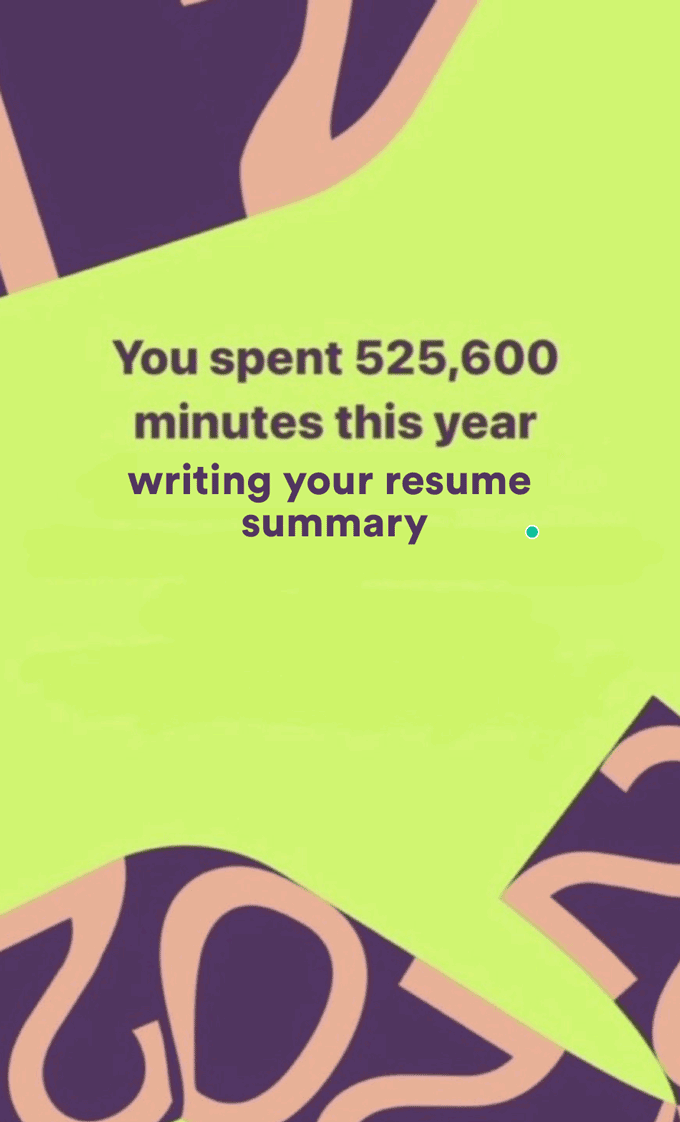
Writing a resume summary isn’t as easy as everyone makes it sound. You have to sum up all your most impressive qualifications and accomplishments in just a handful of sentences, which is a challenge regardless of your experience level. If you’ve spent this long on your resume summary, though, it’s probably time to get a bit of help.
4. If you lack experience, show off your transferable skills
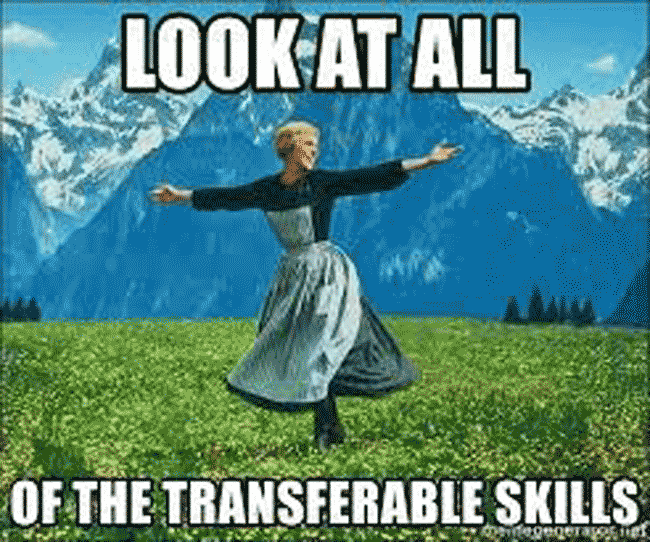
No formal experience? That’s okay, you should still apply for the job you want!
Highlight all of the transferable skills on your resume that make you qualified for the job. All jobs require a strong set of soft skills, and if you have some hard skills to show off then all the better!
5. Update LinkedIn while you’re at it
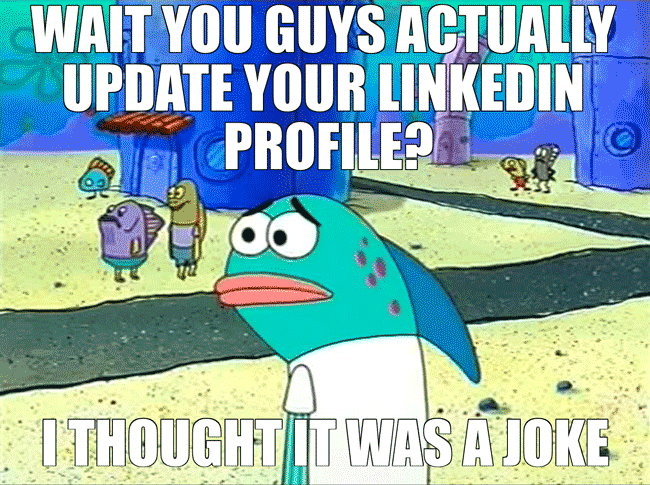
It’s becoming more common to include a LinkedIn URL on your resume. If given a link, interested hiring managers will look at your profile to get a better idea of what you have to offer. Not only that, but recruiters are often actively seeking out candidates on LinkedIn.
You should think of your LinkedIn profile as an extension of your resume and a place for professional networking. If you’re not making the most of it, you might be missing out on some great opportunities.
6. Keep it real
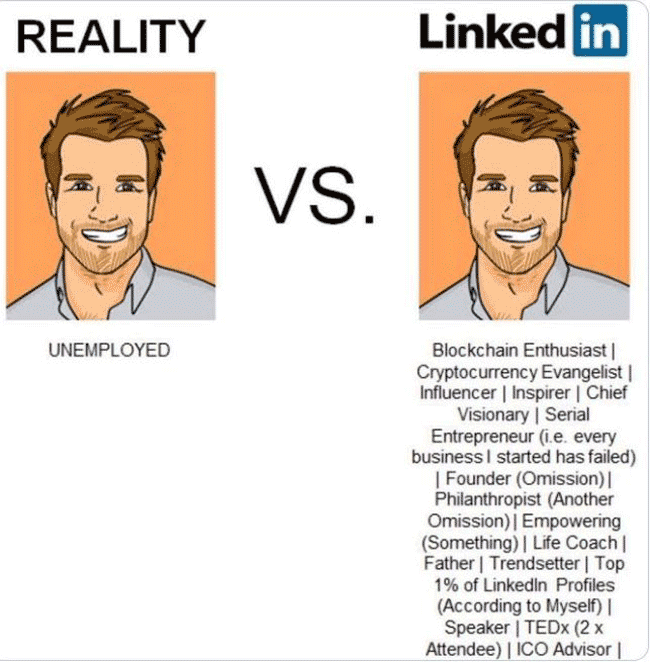
While your LinkedIn profile can be a powerful tool in your job search, it’s important to be careful how you use it.
Social media encourages talking yourself up, but you want to make sure you’re being honest about your qualifications. Recruiters have a lot of experience distinguishing fact from fiction, and a shameless oversell could hurt your chances of getting an interview.
7. Keep it relevant
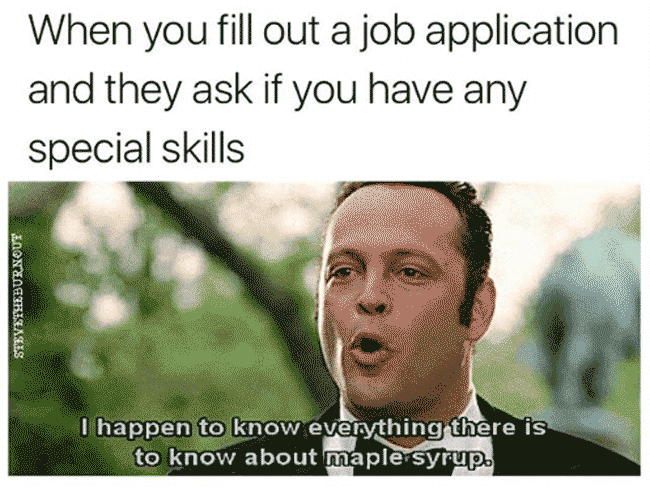
Make sure that the skills you include on your resume are actually relevant to the job you’re applying for.
While there are a handful of jobs in which maple syrup connoisseurship proves helpful (especially if you’re Canadian), this particular skill won’t impress hiring managers in most other industries.
8. Back up your work experience
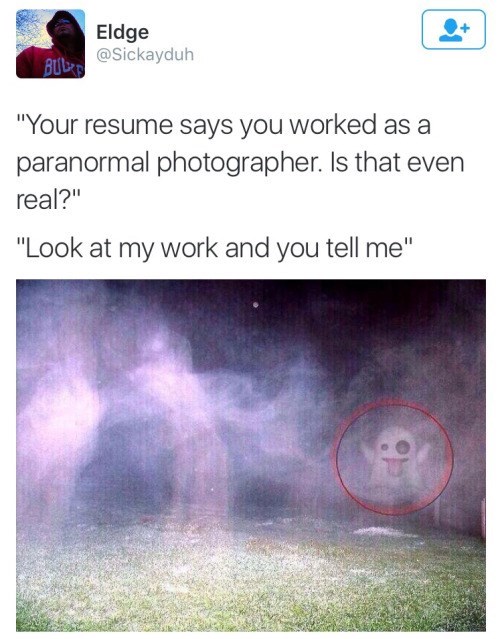
It’s always a good idea to quantify your achievements on your resume or be ready to provide examples when asked about your work experience. This shows hiring managers that you’re not exaggerating your contributions in previous roles.
9. You can make anything sound impressive, including changing a lightbulb
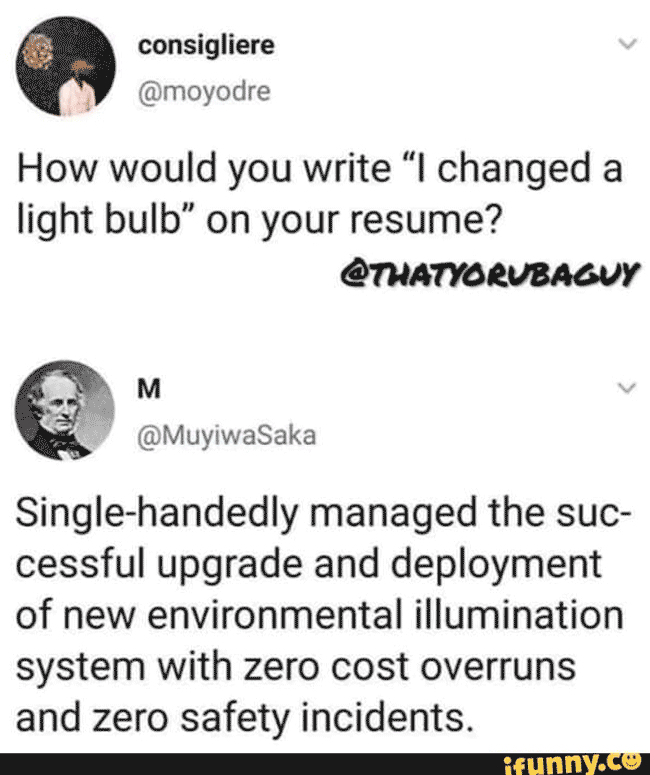
While this is a ridiculous example, it illustrates a good point.
Knowing how to list work experience on a resume is essential when putting together a job application.
You can easily make your experience sound more impressive by editing your bullet points so that they use action verbs and include hard numbers to demonstrate your accomplishments.
10. Look out for mistakes
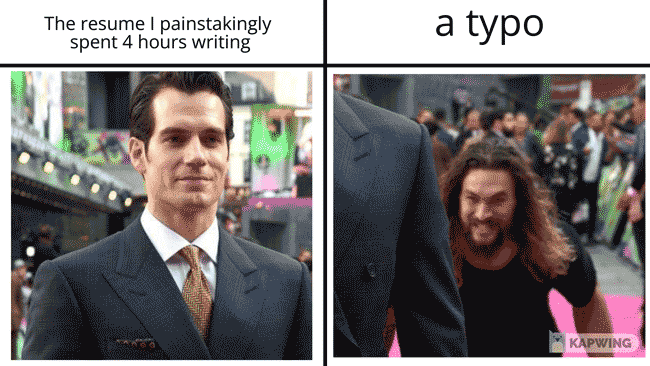
There’s no worse feeling than submitting a resume only to later notice a glaring typo. It’s painful to think that something so small as a misplaced comma could cost you an interview.
Avoid this by editing thoroughly, using spell check, and coming back to your resume after some time apart for a second look. Sometimes a mistake that went unnoticed for hours while you were working on a document can seem obvious the next morning.
11. Have someone proofread your resume
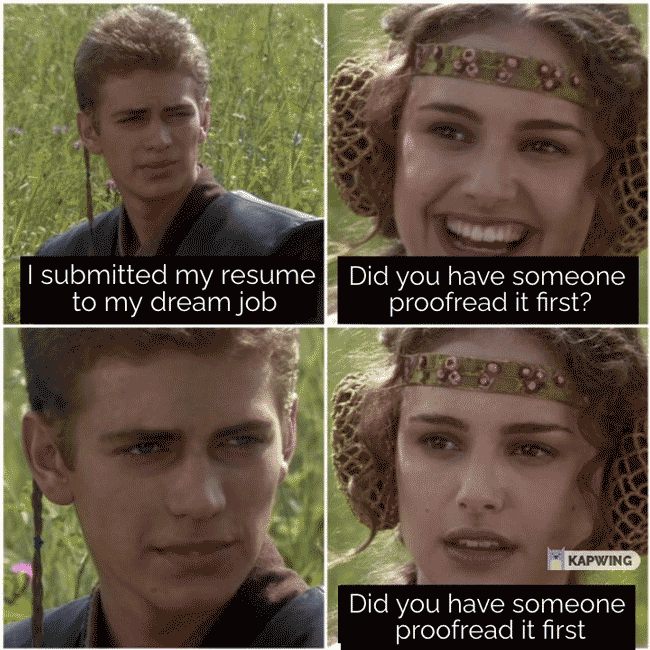
A second pair of eyes can often pick up on mistakes we miss, which is why it’s so important to have someone proofread your resume. That way, you can rest easy when you submit your application.
12. When the application process gets tough, take deep breaths
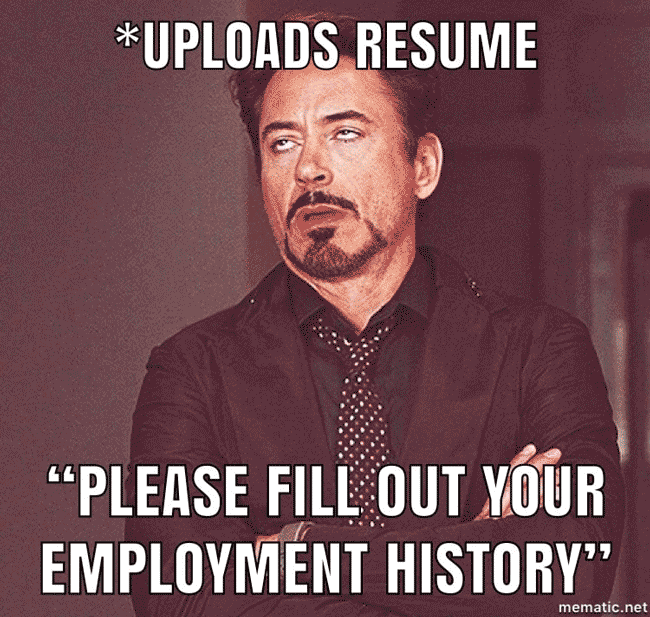
The application process is undeniably changing as the world becomes more technology driven.
This often means contending with clumsy online application processes and Applicant Tracking Systems (ATS) that sometimes require multiple rounds of inputting the same information.
It can be frustrating, to say the least. Save yourself some trouble by making your resume ATS-friendly. If you still have to input your information twice, take a break, get some fresh air and shake it off. Then keep going.
13. Don’t be discouraged
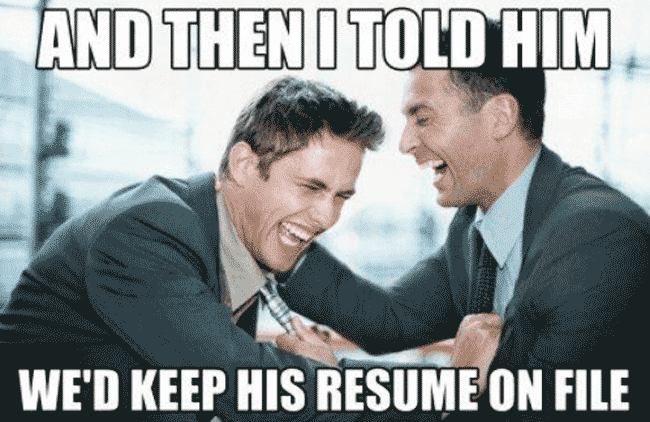
It can be disheartening to pour yourself into hundreds of applications only to receive no response.
If you’re feeling defeated, it could be time to take a step back and examine if there’s anything you could be doing differently. For example, is there an error in your resume? Are you including cover letters? Are you tailoring each one to its target job? Are you using keywords from the job description?
Once you’ve written a resume it can feel like it’s set in stone, but don’t be afraid to make adjustments and try again!
Our free-to-use resume builder can make you a resume in as little as 5 minutes. Just pick the template you want, and our software will format everything for you.
What happens when you lie on a resume?
When you make a resume, it can be tempting to embellish a little… or a lot. It’s good to sell yourself, but probably unwise to say you’re proficient in things you’ve never done before. Why? Here are a few memes that sum up what could happen if you lie on your resume:
14. Your employer might see through your lie
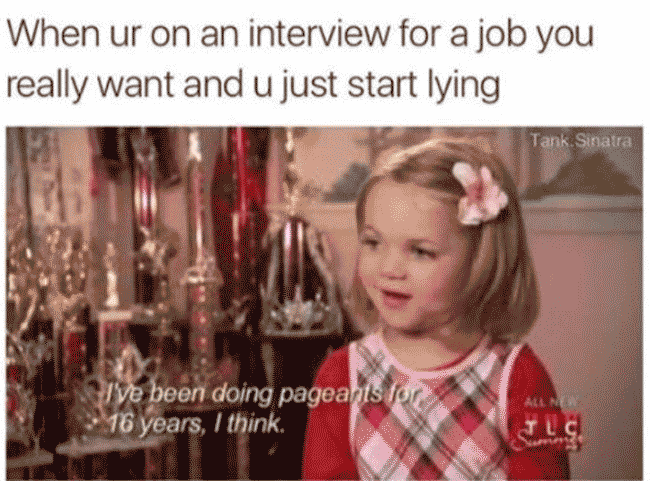
You don’t want to be caught red-handed in a lie.
If a hiring manager has a lot of experience, then they’re probably pretty adept at judging a candidate’s skill level. Needless to say, lying on your resume doesn’t look good to an employer, and if they discover you’re lying it could ruin any chances you had of getting the job.
15. It might be obvious you’re underqualified
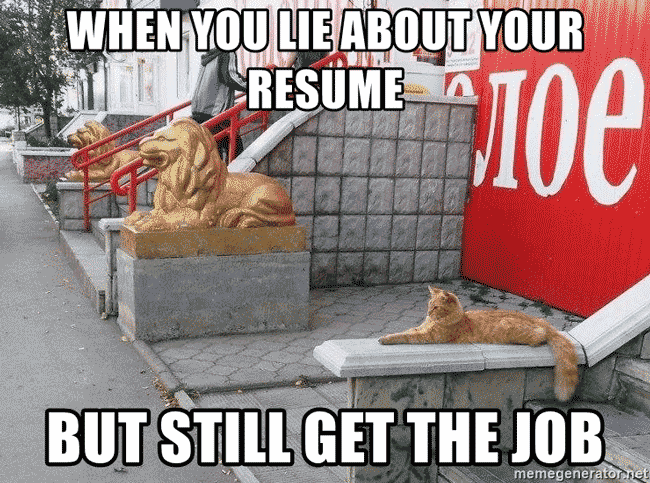
If you manage to land a job but lied to get there, you’d better be a fast learner!
Starting a new job is hard enough without having to ask all the questions you’re already supposed to know the answers to. Chances are you’ll end up looking just as out-of-place as this cat.
16. You could be in over your head
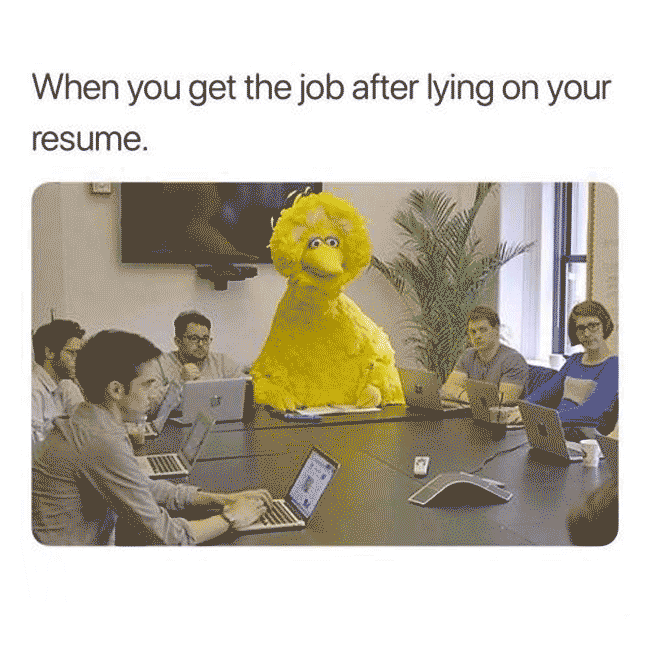
Unless you love to struggle, you’ll likely regret lying on your resume once you actually start the job.
You may find yourself swamped with tasks you don’t have the knowledge or skills to complete, and it’ll be difficult to ask for the help you need without giving yourself away.
Eventually, you’ll end up sticking out in the office just like Big Bird in a corporate meeting.
17. You might be found out
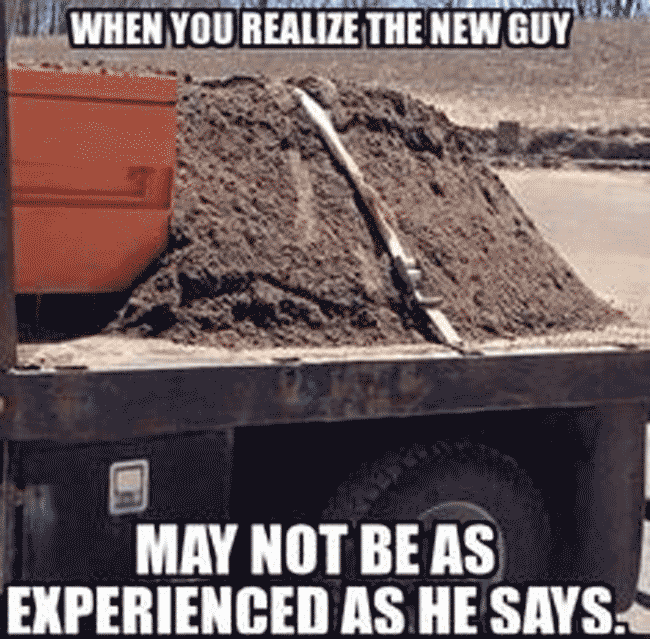
Even if you manage to keep a low profile and maintain your lie, not asking questions about the job comes with its own risks.
If you’re improperly performing your job duties or don’t know what you’re doing, you’ll inevitably be found out once you mess something up and incur the wrath of management.
Now it’s cover letter time
When you successfully finish your resume, it’s time to turn your attention to the next task: writing a cover letter.
18. Don’t give up now
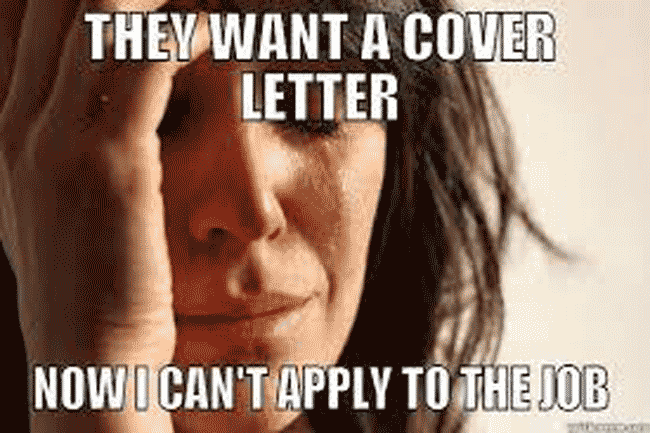
If you’ve spent all day updating your resume, the last thing you want to do is write a cover letter. It’s okay to take a break, but don’t give up!
It’s much easier to start a cover letter if you’ve already got a professional cover letter template. Then you don’t have to worry about how to format all the small stuff, you just need to focus on writing a few good paragraphs about who you are, how you’re qualified, and why you want the job.
19. Start strong
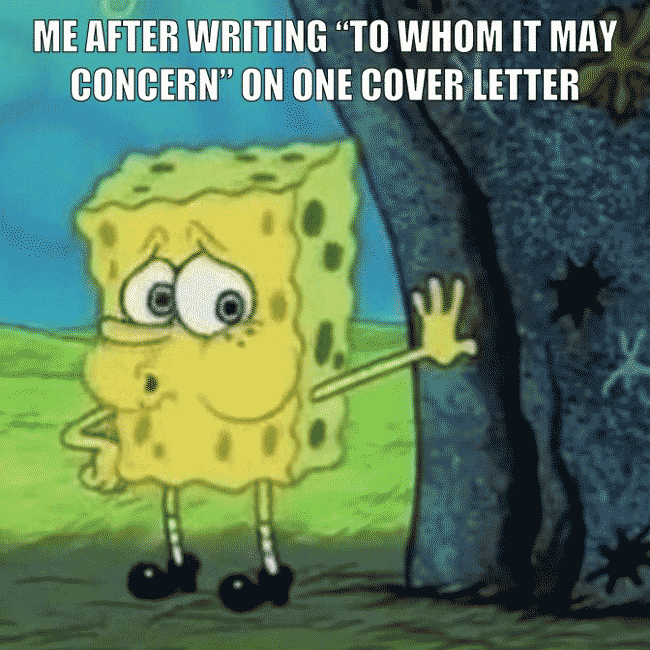
Just starting your cover letter can seem exhausting enough, let alone writing all of it. But trust us: they’re worth the effort. Employers actually do read your cover letter, and often care about what it says.
However, we have a problem with Spongebob’s approach here. Knowing how to address a cover letter might not seem like a big deal, but hiring managers don’t like to see cover letters addressed “To Whom It May Concern”.
It’s easy enough to figure out who your hiring manager is (check LinkedIn or the company website). Start your cover letter on the right foot by using your hiring manager’s name.
20. Customize your cover letters
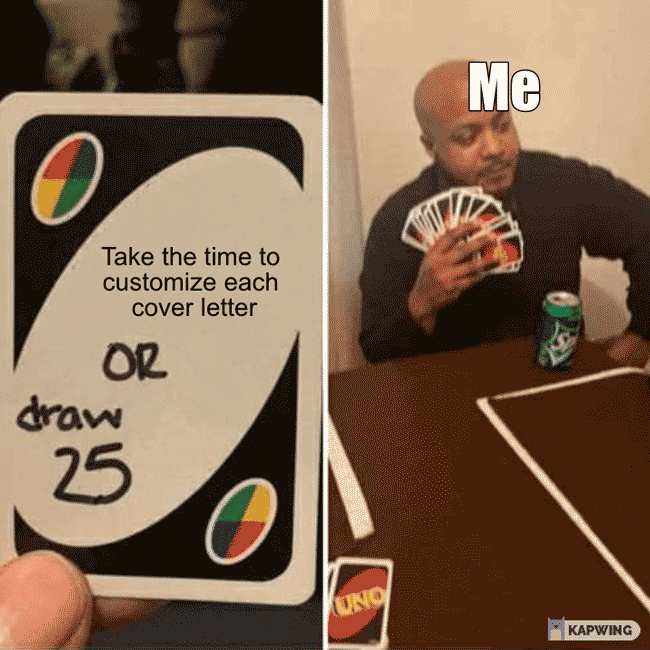
If you’re applying to a lot of jobs, then it can be hard to find the time to customize your cover letters. A generic cover letter is better than no cover letter, but your job application isn’t going to be the best it can be if you aren’t writing a tailored one.
In the long run, customizing each cover letter will go a long way towards making a good impression on potential employers and will increase your chances of landing an interview.
21. Better yet, write a fresh one for each job
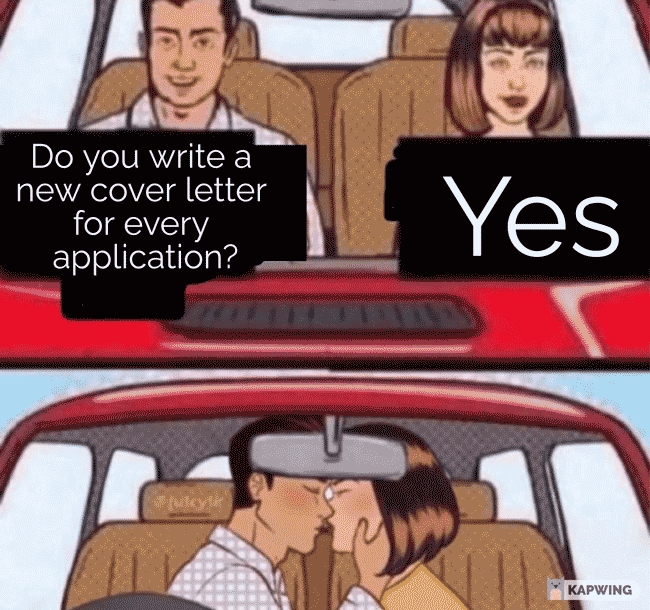
It’s clear when a candidate has put effort into writing a tailored cover letter, and these candidates are usually the ones that win over the hiring manager.
Writing a unique cover letter for each job shows employers that you’re dedicated and enthusiastic about the position. At least for the jobs you’re really serious about, it’s worthwhile to write a new cover letter that explains why you want that specific position.
22. How much detail is too much?
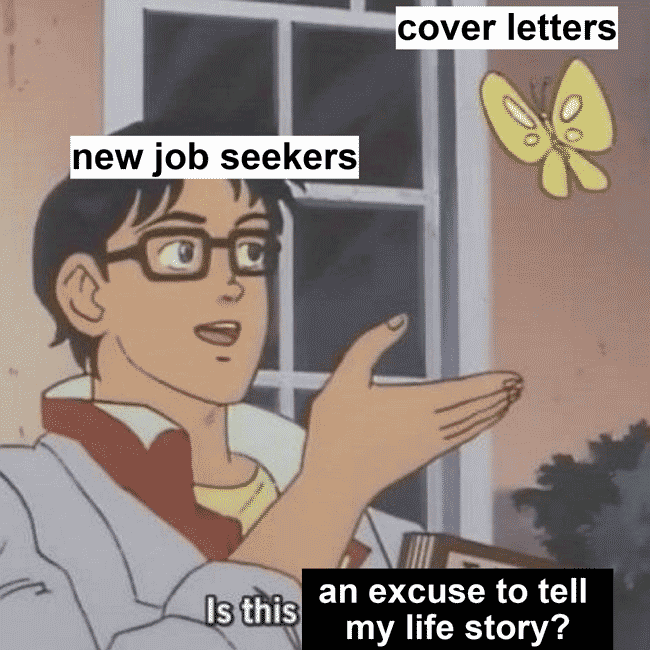
No hiring manager has ever wished a cover letter was longer. Your cover letter should be brief and to the point, including only necessary information. It’s not a place to discuss your entire work history or life story.
Use your cover letter to briefly introduce yourself, highlight key accomplishments that make you qualified for the new position, and discuss your vision for employment and what you can contribute to the company.
Let the offers roll in
When you finish your resume and cover letter, it’s time to sit back and wait for those responses. Before you know it you’ll be preparing for interviews and then, hopefully, your first day!
23. Have confidence
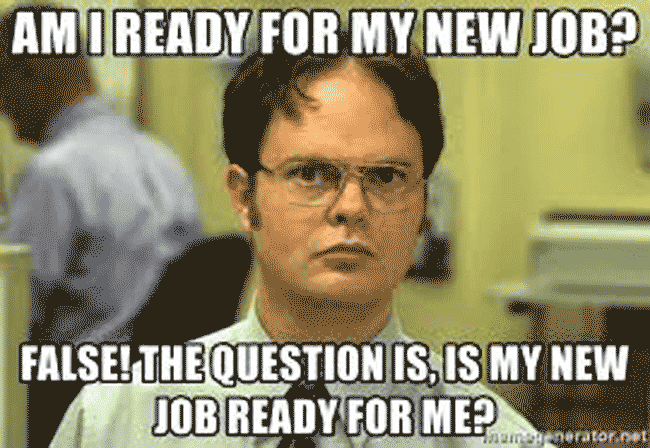
Never underestimate the power of a positive attitude. You can tackle any challenge you set your mind to. Start your new job with confidence, an open mind, a healthy dose of humility, and a willingness to learn.
However, Dwight probably isn’t who you want to act like on your first day.
24. Give it all you’ve got
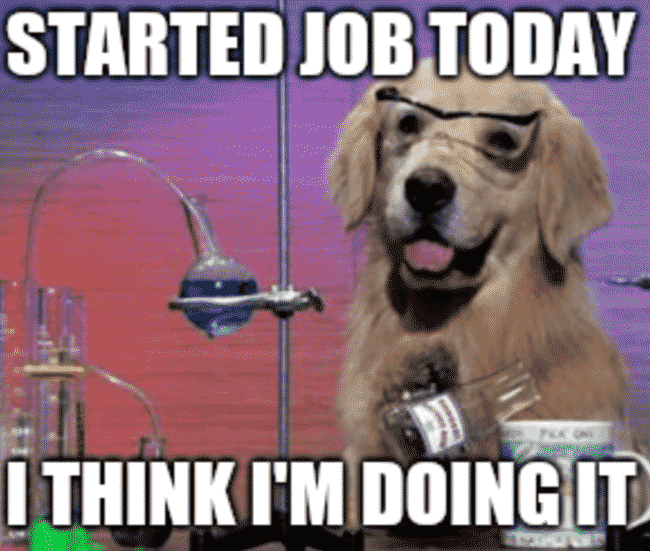
Wherever you find yourself next, you can certainly be proud of all the effort you put into getting yourself there. Hopefully you enjoyed some good memes and laughs along the way.
Click to rate this article
4.8 Average rating


